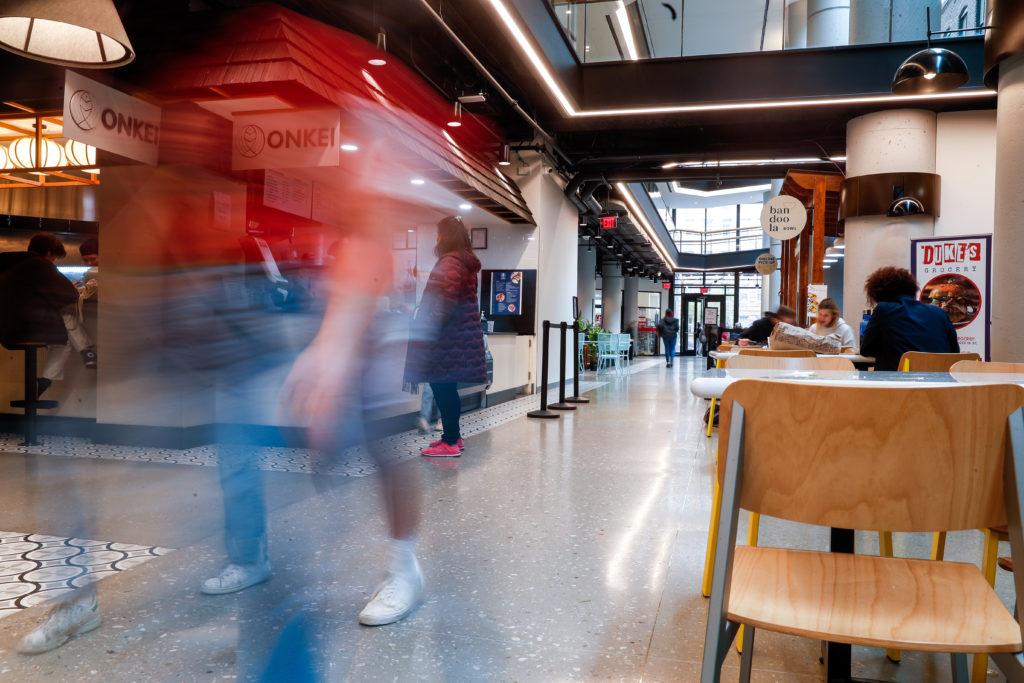A law requiring D.C. businesses to accept cash went into effect Oct. 1, forcing some local businesses to adjust operations.
The D.C. Council passed the Cashless Retailers Prohibition Amendment Act in 2021, but it did not go into effect until the beginning of this month due to COVID-19 and a lack of funding. Businesses on and near GW’s campus must accept cash if they did not already, with some local business owners and managers saying the law helps their businesses welcome those without access to a bank account or credit cards.
Former D.C. Councilmember-at-Large David Grosso initially introduced the bill in 2018, with adjustments from Chair Phil Mendelson. Mendelson authored the law in 2021, saying it would promote equity for people without stable banking.
“It’s surprising, but a substantial number, percentage of the population is unbanked or underbanked, and so this is really about equity,” Mendelson said earlier this month.
Eight percent of D.C. residents are unbanked, meaning they do not have a checking or savings account, and 21 percent of residents are underbanked, meaning they have an account but use check-cashing or payday loans, according to Bank On DC, the D.C. chapter of a national nonprofit connecting residents to financial resources.
More than half a dozen local businesses said accepting cash will make them more accessible to customers without bank accounts.
Chabrina Williams, the director of retail at the George Washington University Museum and The Textile Museum’s Artisans Gallery, said when the museum first opened in 2015, it accepted cash as a form of payment. She said the museum’s finance department ordered the museum to stop accepting cash a few weeks later because it was impossible to make a bank deposit and do a financial report before the museum closed at 7 p.m.
“In terms of those reports, I believe that those kinks have been worked out,” Williams said.
She said when the Textile Museum stopped accepting cash, some visitors still assumed they accepted cash and needed to use another form of payment. Williams said she likes how the new law stops businesses like the museum from excluding those who can not pay with a credit card or who are traveling internationally.
“It’s really awesome to just offer people from all walks of life the opportunity to make a purchase with whichever, whatever their economic status is, or whatever form of currency that they have is accepted,” Williams said.
She said more people in 2015 paid with cash, but since then, fewer customers have tried to pay in cash.
Crystal Fernandez, the manager of Captain Cookie & the Milkman in Western Market, said the business wasn’t fully cashless before the new D.C. law.
“We went cashless for safety reasons during the pandemic because [there was] a lot of theft that were happening,” Fernandez said. “We thought it was safer to do cashless, but if a customer did come in with cash, we would take their payment if they gave exact change.”
Fernandez said since the law’s passage, the business has transitioned to fully accepting cash and hasn’t had security issues. She said the business tries to keep some change on site for customers who do not have exact change.
She said the business changed its training so register operators remember to accept cash even if customers do not have exact change.
“It’s really just getting everyone used to saying, ‘Yes, we do take cash,’” Fernandez said.
Fernandez said Captain Cookie employees have noticed more customers using cash, between $40 and $75 through cash transactions daily.
Sweetgreen — a national salad chain whose I Street location accepts GWorld — stopped accepting cash in 2017, only taking credit cards, debit cards and app purchases as they noticed fewer than 10 percent of all business interactions used cash. Two years later, the restaurant chain switched back to accepting cash after facing backlash about the cashless policy potentially discriminating against people who do not have access to credit cards or a bank account.
Local businesses partnered with GW’s dining program, like PoppaBox on 20th Street and Rōti Mediterranean Grill on I Street, said both vendors see about 10 to 20 percent of their customers pay with cash. General Manager Luis Reyes at Rōti estimates about 20 out of the 200 daily customers pay with cash.
“You see less of people paying with the cash, most of the people will go with the card or will go now with a tap, you know, the digital cards,” Reyes said.
Brian Flores, the director of operations at Bullfrog Bagels, said the bagel shop has always accepted cash. He said trainees must learn how to count change and operate the register, but the business does not require employees to operate the register, letting them take initiative.
“I would think it’s not a very difficult thing to incorporate into a business,” Flores said.
Flores said that there is a “potential risk” to carrying cash, but keeping cash in safe lock boxes and using security cameras helps mitigate that risk. He said some devices that cashless business use, like smart card readers, are also valuable and could pose a security threat.
“We want to be able to serve everyone, we want to be accessible, whether it’s cash or affordable items,” Flores said.





